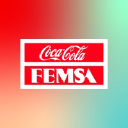🚀 Sign up Free for Public Company Valuation & Insights!
Sign up for free to get access to the best public company valuation and insights. Get started today and unlock the potential of your investments!
Sign Up
Coca-Cola Femsa
Beverages / Beverages and Soft Drinks
At a Glance | Core Facts | Company | Industry | Competitors | Stock Swings | News | Income | Balance | Cash Flow | Growth | Enterprise | Ratios | Metrics | Dividends | Risks | SWOT | Porter's Five Forces | PEST | Score Positive | Clusters | Reports | Web1. Threat of New Entrants
The non-alcoholic beverage industry is highly competitive, and the presence of established players like Coca-Cola Femsa makes it difficult for new entrants to enter the market. The company has a strong global presence and a wide distribution network, making it challenging for new players to compete with its established market position. The high investment required to set up manufacturing facilities and establish a distribution network is also a barrier for new entrants.
2. Bargaining Power of Suppliers
The bargaining power of suppliers in the non-alcoholic beverage industry is low. Coca-Cola Femsa has a large network of suppliers, and the company's bulk purchasing power and long-term relationships with suppliers give it a strong bargaining position. Additionally, the company has been implementing sustainable sourcing strategies, which further decreases its reliance on a single supplier and reduces their bargaining power.
3. Bargaining Power of Buyers
The bargaining power of buyers in the non-alcoholic beverage industry is high. The availability of alternative products and intense competition among existing players give buyers a wide range of choices. Moreover, the low switching cost and availability of substitutes make it easy for buyers to switch to other brands. This strong bargaining power of buyers puts pressure on companies like Coca-Cola Femsa to continuously innovate and maintain competitive pricing strategies.
4. Threat of Substitutes
The threat of substitutes in the non-alcoholic beverage industry is moderate. Coca-Cola Femsa offers a range of products that can be considered as substitutes for each other, such as different flavors of soft drinks. However, the availability of substitutes from competitor brands, as well as other non-alcoholic beverages like tea, coffee, and juice, pose a moderate threat to Coca-Cola Femsa's market position.
5. Intensity of Competitive Rivalry
The non-alcoholic beverage industry is highly competitive, with many established players in the market. Coca-Cola Femsa faces intense competition from companies such as PepsiCo, Dr. Pepper Snapple Group, and Nestle. The competitors in this industry constantly introduce new flavors and products, engage in aggressive marketing campaigns, and offer competitive pricing, making the rivalry intense. The high exit barriers in the industry also contribute to the intense competition.
Overall, Coca-Cola Femsa's strong market presence, wide distribution network, and sustainable sourcing strategies give it a competitive advantage in the industry. However, the company still faces challenges from intense competition, easily available substitutes, and the bargaining power of buyers.